Kadipatta chutney (Curry Leaves Chutney) is a delicious, aromatic and nutritious dry chutney recipe often made in Indian household.
Made with fresh curry leaves that are slightly roasted with lentils and spices to make a finger-licking healthy, nutritious and diabetic-friendly condiment that goes best with any meal and snack.
This is a no onion no garlic, vegan and gluten-free chutney recipe.
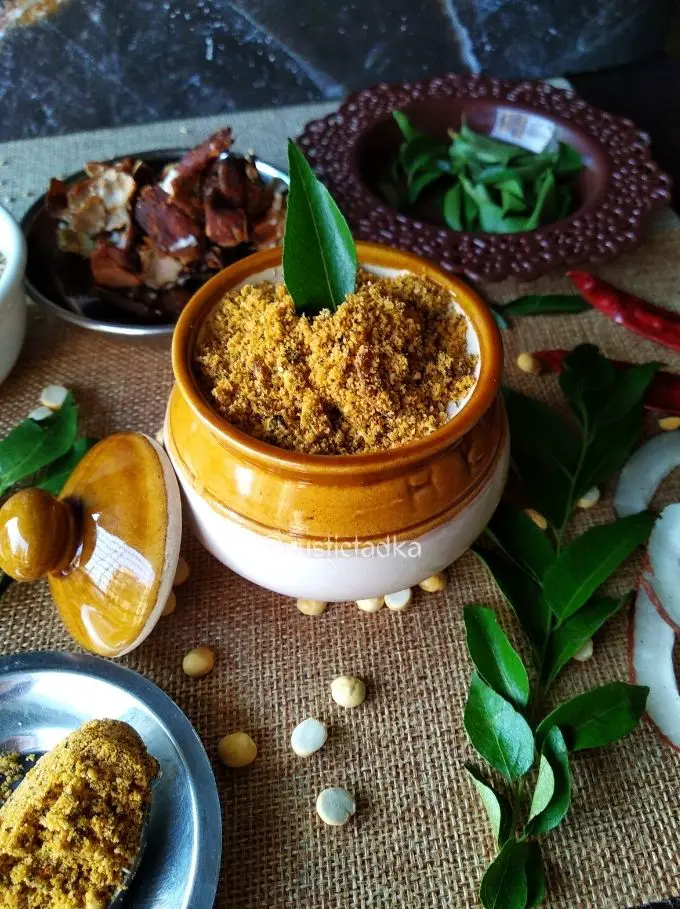
[convertkit form=7110706]
About Kadipatta Chutney (Curry Leaves Chutney)
Throughout the year, I make sure my pantry is stocked with pickles and chutneys.
Condiments play an important role in Indian Cuisine. I always need to have some or the other pickle or chutney with my meal otherwise the meal itself feels incomplete.
Normally my pickles are store-bought, except in summer when we make fresh mango pickles from the hard, tangy raw mangoes. But when it comes to chutney the scene is quite opposite.
I avoid store-bought chutneys as My Mom makes varieties of delicious finger-licking chutneys at home like dry garlic coconut chutney, raw mango chutney, dry peanut chutney, and sweet and tangy sesame chutney to name a few.
One such gem amongst them is super nutritious and flavorful kadipatta chutney also known as curry leaves chutney.
Being crazy about pickles and chutneys, these condiments get over soon at my place.
My Mom purposely makes them in small batches so they can retain their taste, smell and benefits till the time they get finished.
I am always thrilled when a vegetable vendor hands over a huge bunch of curry leaves! Yay! A new batch of curry leaves chutney is about to happen!
Curry leaves / kadipatta leaves are an integral part of Indian cuisine.
These aromatic leaves are extensively used in southern parts of India like Maharashtra, Karnataka, and Andra Pradesh.
In South India, these curry leaves are used prominently in every other dish. Fresh curry leaves chutney imparts a wonderful aroma and flavour to the meal.
Kadipatta / curry leaves provide numerous health benefits. Let’s see some of these benefits:
1. Curry leaves are diabetic friendly (anti-diabetic in nature)
2. They boost iron levels
3. Curry leaves are a rich source of vitamin A
4. These leaves are Antimicrobial
5. They are a rich source of Calcium & Folic Acid
6. Curry leaves are said to be good for digestion
7. They also help in flushing out the toxins from the body
8. Curry leaves oil helps boost hair growth & intake of these leaves boosts skin texture
9. These magical leaves also help in improving eyesight
Looking at these benefits, who wouldn’t like to include this wonderful herb in their diet?
Normally curry leaves are used extensively in tempering and then discarded and not consumed. Intake of this kadipatta chutney ensures that we get all the health benefits this magical plant imparts.
Curry leaves chutney is very easy and quick to make.
This chutney is very tasty and healthy. Made using fresh curry leaves / kadipatta leaves along with tangy tamarind, roasted chana dal also known as Dalia or pandharpuri dal, sesame seeds to name a few and then roasted and ground to a powder.
This chutney is vegan and gluten-free.
Once made this kadipatta chutney can be stored in an air-tight container which stays good for about 4 weeks at room temperature. Fresh curry leaves infuse wonderful flavour to any dish they touch.
Apart from just including this as a condiment, this is such a versatile chutney that can be added to curries, rolled in chapati for a healthy mid day snack, placed in between two slices of bread for those evening cravings and served along with a hot cup of tea.
For a healthier version use multigrain bread or whole wheat bread. And there you go, sorted out for those nasty hunger pangs!
To make this chutney no tempering is used.
This is a no onion no garlic chutney (satvik chutney). This kadipatta chutney has a distinct aroma and adds flavour to the meals.
This kadipatta chutney / curry leaves chutney goes very well with savoury pancakes like dhirde, ghavan, dhapate (Maharashtrian snacks), pakoda and most South Indian snacks like Rava dosa, idli, vada, uttapams to name a few.
I like to have it with pithla bhat, amti bhat (dal rice), sambar rice and moong dal khichadi too! Curry leaves chutney / dry kadipatta chutney oomph up the taste of any meal you had it with.
Recipe Video of Curry Leaves Chutney
Serving Options
This curry leaves chutney makes the best condiment to have with regular meals.
You can also sprinkle it over salads, wraps or Indian kachumbar recipes.
Storage Suggestion
Store this curry leaves chutney at room temperature in an air-tight container. This chutney stays good for 2 weeks. Always make sure to use a dry spoon while scooping out the chutney from the jar.
How To Make Curry Leaves Chutney (Kadi Patta Chutney)
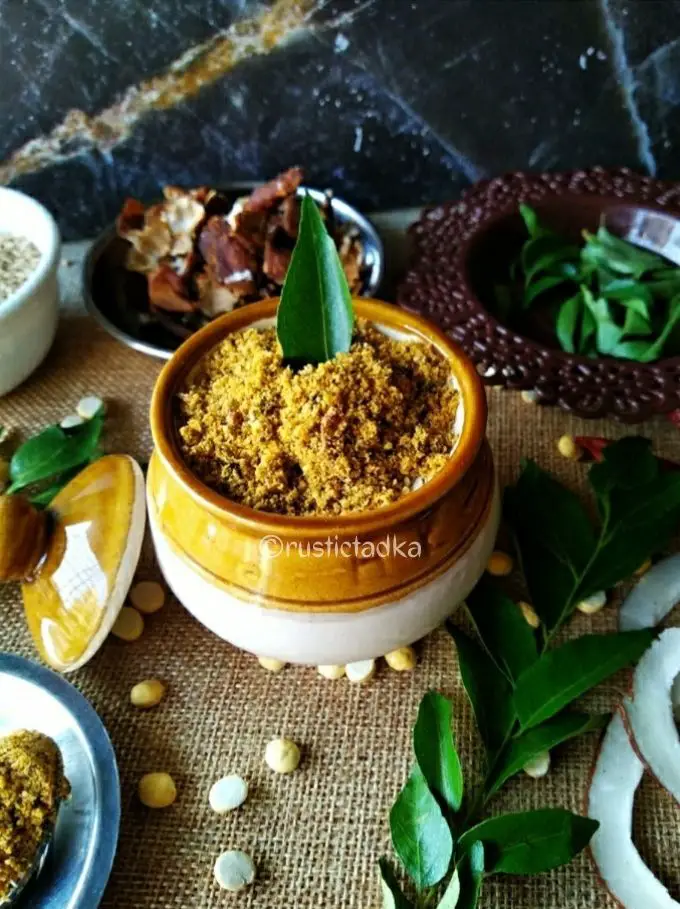
Join “Easy Indian Vegetarian & Vegan Recipes” on Facebook & be a part of our community.
If you like recipes like these, let’s connect on YouTube, Instagram & Facebook. Thank you for stopping by, I would really love to know your thoughts on this recipe.
Also, do check out my Lifestyle Blog eralivine.com if interested.
Recipe Card

Kadipatta Chutney | Curry Leaves Chutney
Ingredients
Method
- In a thick bottom pan, heat 1/2 tsp of oil.
- Add curry leaves and roast till they turn crisp and loose the moisture. Keep them aside to cool.
- In the same pan, dry roast, white sesame seeds, grated dry coconut, and tamarind individually one by one for 4-5 minutes on a low flame.
- Make sure not to use tamarind pulp in this recipe.
- Roast ingredients till they slightly change their colour. Make sure not to burn them.
- Once all ingredients are roasted, allow them to cool down completely.
- Now, in a blender add all the roasted ingredients along with curry leaves.
- Add salt and red chilli powder.
- Grind to a fine powder.
- Nutritious kadipatta chutney (curry leaves chutney) is ready.
- Store it in an air-tight container at room temperature.

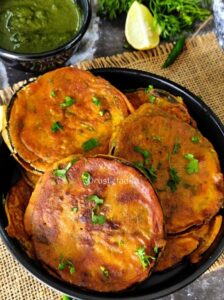
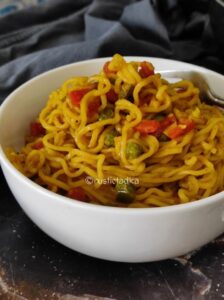
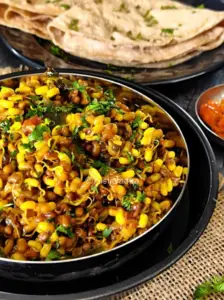
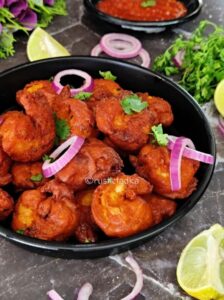
Lovely recipe